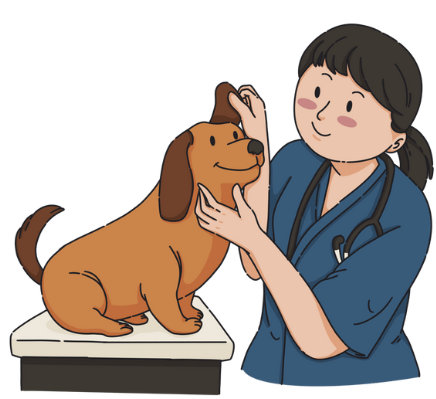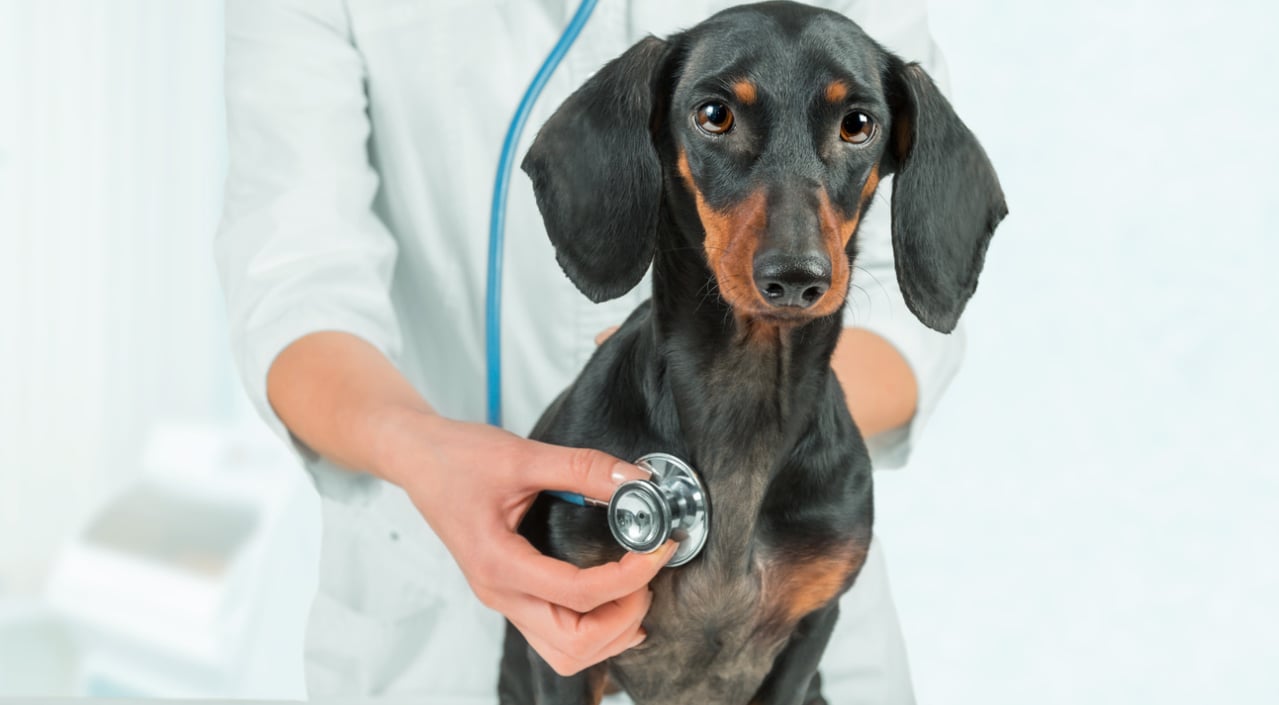Welcome to The Ultimate Puppy Vaccine Schedule: A Month-by-Month Guide. Ensuring your puppy’s health begins with a structured vaccine schedule, a crucial step for their well-being. This guide will navigate you through the essential vaccinations every puppy needs.
In San Diego, Black Mountain Animal Hospital stands out as a trusted name in veterinary care. Since 1987, it has been enhancing the pet-owner bond through exceptional services, ranging from urgent care to routine wellness exams. Whether it’s Dr. Polosetski or Dr. Canseco leading the team, you can rely on their expertise and compassionate care.
Following a structured vaccine schedule not only safeguards your puppy against infectious diseases but also contributes to their long-term health. By adhering to this schedule, you’ll be taking proactive steps to ensure your furry friend leads a happy and healthy life.
In case of emergencies, it’s important to know the types of pet emergencies you should recognize. Being prepared can make all the difference when it matters most. If you’re located in areas like Carmel Valley or Rancho Santa Fe, Black Mountain Animal Hospital offers reliable drop-off appointment services for urgent cases.
Understanding Puppy Vaccinations
Puppy vaccinations are a crucial component in safeguarding your furry friend’s health. These puppy injections work by stimulating the immune system to prepare it for potential threats posed by infectious diseases. By introducing a harmless form of the disease-causing organism, vaccines enable your puppy’s body to build resistance without causing illness.
Core Vaccines vs. Non-Core Vaccines
Vaccines for puppies are categorized into two types: core vaccines and non-core vaccines.
-
Core Vaccines
Essential for all puppies, these include protection against diseases that pose significant health risks and have a widespread prevalence. Examples of core vaccines are:
- DHPP Vaccine: Protects against Distemper, Hepatitis, Parainfluenza, and Parvovirus.
- Rabies Vaccine: Vital not only for your puppy’s health but also due to its legal requirement in many regions.
-
Non-Core Vaccines
Administered based on the puppy’s lifestyle, environment, and specific risk factors. These are not universally required but may be recommended under certain circumstances. Examples include:
- Bordetella Bronchiseptica Vaccine: Often advised for puppies that frequent social settings like dog parks or boarding facilities.
- Leptospirosis Vaccine: Considered if your puppy is at risk of exposure to environments where this zoonotic disease is prevalent.
Understanding these vaccination categories helps ensure your puppy receives the right protection tailored to their needs. This comprehensive approach maximizes the vaccination benefits and enhances the overall well-being of your pet.
However, vaccinations are just one aspect of maintaining your puppy’s health. You should also be aware of potential pet allergies that could affect their quality of life. In more severe cases where mass removals of certain growths or tumors are necessary, our mass removal services can provide the required medical assistance.
If you find yourself needing to book an overdue appointment for your pet’s vaccination or any other health issue, don’t hesitate to reach out to us for assistance.
The Core Vaccines Explained
-
Distemper (Canine Distemper Virus – CDV)
Distemper is a highly contagious viral disease that affects a puppy’s respiratory, gastrointestinal, and central nervous systems. Puppies with distemper may experience symptoms like fever, coughing, vomiting, diarrhea, seizures, and even paralysis. Without vaccination, distemper can be fatal or lead to permanent damage.
-
Hepatitis (Canine Adenovirus Type 1 – CAV-1)
Canine hepatitis is caused by adenovirus type 1 and primarily affects the liver. Infected puppies may show signs such as fever, abdominal pain, vomiting, and jaundice. Severe cases can result in liver failure or death. The vaccine for hepatitis is combined with adenovirus type 2 (CAV-2) to protect against both hepatitis and respiratory infections.
-
Parainfluenza (Canine Parainfluenza Virus – CPIV)
Parainfluenza is one of the several viruses responsible for kennel cough in dogs. It causes symptoms similar to a cold in humans: coughing, sneezing, and nasal discharge. While generally less severe than other diseases on this list, parainfluenza can complicate into more serious respiratory conditions if left untreated.
-
Parvovirus (Canine Parvovirus – CPV)
Parvovirus is an extremely contagious virus that attacks the gastrointestinal tract of puppies. Symptoms include severe vomiting and diarrhea, which can quickly lead to dehydration and electrolyte imbalances. Without prompt treatment and vaccination, parvovirus often proves fatal.
Each of these vaccines plays a crucial role in safeguarding your puppy’s health against diseases that could otherwise have devastating effects. They form part of the DHPP combination vaccine—often administered together to provide comprehensive protection during your puppy’s early stages of life.
Understanding these core vaccines helps ensure your puppy receives the best start toward a healthy life by reducing the risk of serious illnesses. Black Mountain Animal Hospital emphasizes these vaccines as part of their preventative care services to create a strong foundation for your pet’s long-term well-being.
Month-by-Month Vaccine Schedule for Puppies
6-8 Weeks Old: First Dose of DHPP Vaccine
Starting the vaccination process when your puppy is between 6 to 8 weeks old is crucial. At this young age, their immune systems are still developing, making them susceptible to infectious diseases. Administering the first dose of the DHPP vaccine—which covers Distemper, Hepatitis, Parainfluenza, and Parvovirus—provides essential initial protection.
Why Begin Early?
- Immune System Development: Puppies are born with some immunity from their mothers, but this wanes over time. Vaccinations help build their own defenses.
- Contagious Diseases: Early vaccination reduces the risk of contracting common contagious diseases during critical development stages.
What to Expect During the Veterinary Visit
Visiting a trusted veterinary clinic like Black Mountain Animal Hospital ensures your puppy receives comprehensive care during their first vaccination appointment. You can book a visit online for convenience.
- Check-up: The veterinarian will perform a general health check to ensure your puppy is healthy enough for the vaccine.
- Administration of DHPP Vaccine: This involves a quick injection, typically into the scruff of the neck or hind leg.
- Observation Period: Post-vaccination, there may be a brief observation period at the clinic to monitor for any immediate reactions.
Potential Side Effects
While side effects are generally mild, it’s essential to be aware of them:
- Lethargy: Temporary tiredness or reduced activity levels.
- Mild Fever: A slight increase in body temperature.
- Localized Swelling or Discomfort: Minor swelling or soreness at the injection site.
Being informed about these aspects prepares you for what lies ahead and helps ensure your puppy remains healthy as they progress through their vaccination timeline.
10-12 Weeks Old: Second Dose of DHPP Vaccine
The second dose of the DHPP vaccine at 10-12 weeks old is a crucial part of your puppy’s vaccination timeline. This follow-up dose is essential to boost the puppy’s immune response, ensuring a more robust defense against diseases such as distemper, hepatitis, parainfluenza, and parvovirus. By this age, your puppy has reached important milestones, and maintaining a structured vaccine schedule is key to their ongoing health.
Preparing for this veterinary visit involves making sure your puppy is calm and relaxed. Here are some tips:
- Familiarize Your Puppy with Travel: Before the visit, take short car rides to make them comfortable with traveling.
- Comfort Items: Bring along a favorite toy or blanket to provide familiarity and comfort during the trip.
- Feeding Schedule: Feed your puppy a light meal before the visit to prevent any stomach upset during travel.
Maintaining regular veterinary visits throughout these early weeks helps reinforce the protective barrier provided by vaccines, keeping your puppy on track for a healthy life ahead.
14-16 Weeks Old: Third Dose of DHPP Vaccine and Rabies Vaccination (Legal Requirement)
At the 14-16 week mark, your puppy reaches a critical milestone in their vaccination timeline. This phase marks the administration of the third and final dose of the DHPP vaccine, a crucial step in establishing long-term immunity against distemper, hepatitis, parainfluenza, and parvovirus. Each of these diseases poses significant health risks, and this final dose ensures your puppy’s immune system is fully equipped to combat them.
Additionally, this stage introduces the rabies vaccination into your puppy’s vaccine schedule. Rabies is a fatal viral disease with serious implications not just for pets but also for humans. Its prevention is crucial; hence, it is legally mandated in many regions. The rabies vaccine not only protects your puppy’s health but also fulfills legal responsibilities, ensuring compliance with local regulations.
During these veterinary visits, it’s essential to keep track of your puppy’s age milestones and adhere strictly to the recommended timelines. Staying on schedule with vaccinations helps protect your pet from preventable diseases, keeping them healthy and safe as they continue to grow and explore their environment. For essential vaccinations like these, consider visiting a local pet vaccination clinic such as the one in Rancho Penasquitos for professional assistance.
1 Year Post Last Puppy Shot: Booster Doses for DHPP and Rabies Vaccine
To keep your furry friend healthy, it’s important to maintain their immunity levels through booster doses of DHPP and rabies vaccines. These boosters provide ongoing protection against diseases like Distemper, Hepatitis, Parainfluenza, Parvovirus, and rabies.
During the annual veterinary check-up, your vet will conduct a thorough examination and administer these booster shots. They will evaluate your puppy’s overall health, look for any signs of illness, and address any concerns you may have. This visit also allows you to review your pup’s vaccination timeline and ensure that all required vaccinations are in line with the recommended schedule.
Remember these key points:
- Booster Shots: Important for maintaining immunity.
- Veterinary Visit: Includes a comprehensive health check-up.
- Puppy Age Milestones: Stay on top of vaccination schedule for optimal health.
Make sure to prioritize this routine in your puppy’s care plan so they can thrive as they grow.
Additional Non-Core Vaccines to Consider for Your Puppy’s Health
Bordetella Bronchiseptica Vaccine: Protecting Against Kennel Cough
Bordetella bronchiseptica is a highly contagious bacterium known to cause kennel cough in dogs. This respiratory infection is characterized by a persistent, hacking cough that can easily spread through the air when an infected dog coughs or sneezes. Puppies are particularly susceptible due to their developing immune systems.
Administering the Bordetella vaccine can be crucial in preventing outbreaks, especially in environments where dogs interact closely. Common settings include:
- Doggy daycare
- Boarding facilities
- Dog parks
- Grooming salons
The timing for the Bordetella vaccine varies depending on your puppy’s lifestyle and exposure risk. Veterinarians often recommend starting this vaccine as early as 6 to 8 weeks of age, followed by boosters every six months to a year. The frequency may depend on how often your puppy frequents high-risk areas.
Leptospirosis Vaccine: Safeguarding Against a Zoonotic Disease
Leptospirosis is another concern for pet owners, as this zoonotic disease can affect both animals and humans. Caused by bacteria found in water or soil contaminated by animal urine, leptospirosis can lead to severe health issues such as kidney and liver damage.
Consider vaccinating your puppy with the leptospirosis vaccine if you live in areas prone to the disease or frequently engage in outdoor activities like hiking or camping with your pet.
Exploring Other Non-Core Vaccines
Other non-core vaccines that might be essential based on your puppy’s lifestyle include:
- Lyme Disease Vaccine: Protects against Lyme disease transmitted through tick bites.
- Canine Influenza Vaccine: Essential in preventing dog flu outbreaks, especially during colder months or in regions with known influenza cases.
These additional vaccines play a pivotal role in safeguarding not just the health of your puppy but also contribute significantly to community health by minimizing the spread of infectious diseases.
Leptospirosis Vaccine: Protecting Against a Zoonotic Disease
Leptospirosis is a bacterial infection that poses a significant threat to both dogs and humans. The bacteria can be transmitted through contact with contaminated water sources or soil, making it particularly concerning for puppies who love to explore outdoors.
Understanding Leptospirosis:
- Transmission: The infection spreads through the urine of infected animals, contaminating water and soil in environments like ponds, puddles, and even moist ground.
- Symptoms: Infected puppies may exhibit signs such as fever, muscle pain, vomiting, or jaundice. If left untreated, severe cases can lead to kidney or liver failure.
Factors Influencing Vaccination:
- Exposure Risk: Puppies that spend a lot of time in rural areas or frequent parks with standing water are at higher risk.
- Geographical Location: Some regions have higher incidences of leptospirosis due to climate and local wildlife.
While core vaccines are vital for all puppies, non-core vaccines like the leptospirosis vaccine should be considered based on lifestyle and exposure risks. Consulting with a trusted veterinarian at Black Mountain Animal Hospital will help determine the best vaccination plan tailored to your puppy’s needs.
Incorporating non-core vaccines such as the Bordetella bronchiseptica vaccine, Lyme disease vaccine, and Canine influenza vaccine into your puppy’s schedule may provide additional protection against various infectious diseases.
Lyme Disease Vaccine: A Step Towards Tick Prevention
Lyme disease is a tick-borne illness caused by the Borrelia burgdorferi bacterium that poses significant health risks to dogs. If not treated promptly, it can lead to severe joint problems and even more serious complications. One crucial way to prevent this debilitating disease is by administering the Lyme disease vaccine for puppies.
Timing Matters
When it comes to the Lyme disease vaccine, timing is essential. It’s important to align vaccinations with local tick activity patterns to ensure optimal protection for your puppy. The best way to determine this schedule is by consulting with your veterinarian who can provide guidance based on your specific geographic location and the seasonal prevalence of ticks in your area.
Core and Non-Core Vaccines
While core vaccines are vital for every puppy, some may benefit from additional non-core vaccines like the Lyme disease vaccine, Bordetella bronchiseptica vaccine, Leptospirosis vaccine, and Canine influenza vaccine. These decisions often depend on various factors such as lifestyle, exposure risk, and specific regional threats.
As you navigate through The Ultimate Puppy Vaccine Schedule: A Month-by-Month Guide, keep in mind that these tailored choices can significantly enhance your puppy’s overall health and well-being.
Long-Term Health Benefits
Understanding and implementing the appropriate vaccination strategy helps ensure your furry friend’s long-term health and happiness, especially in environments where ticks are prevalent.
Canine Influenza Vaccine: Staying Ahead of Canine Flu Outbreaks
Understanding canine influenza is essential for safeguarding your puppy’s health. This viral respiratory infection can spread rapidly, especially in environments where dogs are in close quarters, such as boarding facilities, dog parks, or daycare centers.
Key Facts About Canine Influenza
- Two Strains: Canine influenza currently has two prevalent strains—H3N8 and H3N2. Both strains have vaccines available that are specifically designed to protect against the respective virus.
- Vaccine Importance: Administering the canine influenza vaccine for puppies can significantly reduce the risk of infection and the severity of symptoms should an outbreak occur.
While core vaccines like DHPP and rabies are vital, non-core vaccines, including the canine influenza vaccine, may be necessary depending on your puppy’s lifestyle and potential exposure risks. Consulting with trusted professionals at Black Mountain Animal Hospital can help determine if this additional protection aligns with your puppy’s needs.
Incorporating the canine influenza vaccine into your puppy’s health plan is a proactive step towards maintaining wellness amidst potential flu outbreaks. Alongside other non-core options like the Bordetella bronchiseptica vaccine and Leptospirosis vaccine, it forms part of a comprehensive approach detailed in “The Ultimate Puppy Vaccine Schedule: A Month-by-Month Guide”.
Costs Associated with Puppy Vaccinations: Budgeting for Your Furry Friend’s Health
Understanding the financial aspect of vaccination costs for puppies is crucial for planning your pet’s early healthcare journey. Ensuring that your puppy receives all necessary vaccines is a vital investment in their health and wellbeing.
Factors Influencing Vaccination Costs
Several factors can influence the cost of vaccinating your puppy:
- Veterinary Clinic: Prices may vary between clinics. Black Mountain Animal Hospital, known for its exceptional care, offers competitive pricing reflective of its high-quality services.
- Location: Urban areas might have higher costs compared to rural settings due to differences in overhead expenses.
- Type of Vaccine: Core vaccines like DHPP and Rabies are generally essential, while non-core vaccines such as Bordetella or Leptospirosis could add to the total cost if deemed necessary for your puppy’s lifestyle.
Planning Ahead
Budgeting ahead ensures that you can meet these costs without compromising on essential veterinary care. Consider setting aside funds specifically for your puppy’s healthcare needs or exploring pet insurance options that cover vaccinations. Taking proactive steps helps safeguard not only your puppy’s health but also provides peace of mind knowing you are prepared for this essential aspect of pet ownership.
The Role of Veterinarians in Your Puppy’s Vaccination Journey
Engaging with a trusted veterinarian is crucial in navigating your puppy’s vaccination journey. At Black Mountain Animal Hospital, the experienced team, including Dr. Polosetski and Dr. Canseco, provides invaluable veterinary guidance in puppy vaccinations, ensuring your furry friend receives the care they need.
Veterinarians play several vital roles:
- Tailored Vaccine Schedules: Each puppy is unique. Your veterinarian will consider factors such as breed, age, lifestyle, and health status to tailor a vaccination schedule that fits your pet’s specific needs.
- Monitoring Health: Regular check-ups during vaccine appointments allow veterinarians to monitor your puppy’s overall health. This proactive approach helps identify any potential health issues early on.
- Education and Support: Veterinary professionals offer educational resources to pet owners. They provide insights into each vaccine’s purpose and potential side effects, empowering you to make informed decisions.
- Administering Vaccines Safely: Veterinarians ensure vaccines are administered correctly and safely. Their expertise minimizes risks and ensures the effectiveness of the vaccination process.
- Legal Compliance: Rabies vaccinations are a legal requirement in many areas. Veterinarians help ensure compliance with local laws, keeping your pet safe and within legal guidelines.
Black Mountain Animal Hospital’s commitment to exceptional care extends beyond routine vaccinations. Their team values clear communication, ensuring that every pet owner leaves informed and confident about their puppy’s health plan. By entrusting this journey to skilled veterinarians, you prioritize your puppy’s well-being and lay a strong foundation for their future health.
Beyond Vaccinations: Other Essential Aspects of Early Preventative Care
Ensuring your puppy’s health goes beyond adhering to “The Ultimate Puppy Vaccine Schedule: A Month-by-Month Guide.” A comprehensive approach to preventative care includes several crucial components that work together to safeguard your puppy’s well-being.
Deworming Treatments for Puppies
Puppies are often born with worms, or they may acquire them shortly after birth through their mother’s milk. These parasites can lead to serious health issues, such as malnutrition, anemia, and gastrointestinal distress. Deworming treatments for puppies are essential to eliminate these parasites and maintain optimal health.
- Frequency: Deworming typically starts at two weeks of age and continues every two weeks until the puppy is twelve weeks old. After that, monthly treatments are recommended until six months.
- Common Types of Worms: Roundworms, hookworms, and tapeworms.
- Signs of Infestation: Look out for symptoms like diarrhea, weight loss, bloated abdomen, and lethargy.
Regular Health Check-ups
Routine veterinary visits play a fundamental role in early preventative care. These check-ups allow veterinarians to monitor growth and development, administer necessary vaccines, and address any emerging health concerns. Regular visits also help acclimate your puppy to the veterinary environment, reducing stress during future appointments.
Nutritional Guidance
A balanced diet is crucial for a growing puppy. Consulting with a veterinarian about proper nutrition ensures your puppy receives the right nutrients for healthy growth. Consider factors such as breed-specific dietary needs and any potential food allergies or sensitivities.
These components form the foundation of a well-rounded health plan for your puppy. By integrating deworming treatments and regular veterinary care alongside vaccinations, you provide comprehensive protection against various health threats.
Conclusion
Following The Ultimate Puppy Vaccine Schedule: A Month-by-Month Guide ensures your puppy receives the best start in life. By adhering to a structured vaccination plan, you protect your furry friend from potentially life-threatening diseases. Regular veterinary visits at Black Mountain Animal Hospital not only keep your puppy healthy but also strengthen the bond between you and your pet. Remember, vaccinations are just one part of comprehensive care, contributing to a happy and healthy future for your beloved companion.
FAQs (Frequently Asked Questions)
What is the importance of following a puppy vaccine schedule?
Following a structured vaccine schedule is crucial for your puppy's health and well-being. It helps protect them from infectious diseases, ensures they develop a strong immune system, and complies with local legal requirements for vaccinations.
What are core vaccines for puppies?
Core vaccines are essential vaccinations that all puppies should receive to protect against severe and potentially fatal diseases. The core vaccines include Distemper, Hepatitis (Adenovirus), Parainfluenza, and Parvovirus. These vaccines provide critical protection during the early stages of a puppy's life.
At what age should my puppy receive their first vaccination?
Puppies should receive their first dose of the DHPP vaccine between 6 to 8 weeks old. Starting the vaccination process early is important to provide initial protection against contagious diseases.
Why do puppies need booster shots after their initial vaccinations?
Booster shots are necessary to maintain immunity levels against diseases as they help reinforce the immune response developed from the initial vaccinations. A booster for DHPP and Rabies is typically administered one year after the last puppy shot.
What are non-core vaccines and when should they be considered?
Non-core vaccines are additional vaccinations that may be beneficial depending on your puppy's lifestyle and risk factors. Examples include Bordetella bronchiseptica (for kennel cough) and Leptospirosis. These vaccines should be considered based on exposure risks such as social settings or geographic location.
How can I prepare my puppy for a veterinary visit for vaccinations?
To prepare your puppy for a veterinary visit, ensure they are calm and relaxed. You can take them for a short walk beforehand, bring their favorite toy or blanket, and avoid feeding them just before the appointment to reduce anxiety during the visit.








